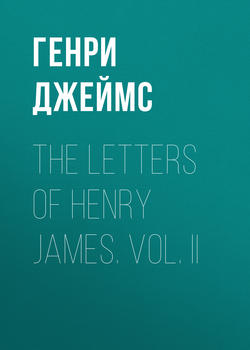Читать книгу The Letters of Henry James. Vol. II - Генри Джеймс, Henry Foss James - Страница 40
VI
Rye (continued)
(1904-1909)
To Dr. and Mrs. J. William White
ОглавлениеH.J. had enjoyed the hospitality of these friends at Philadelphia, during his last visit to America.
Dictated.
Lamb House, Rye.
Jan. 1, 1908.
Dear William and Letitia!
It would be monstrous of me to say that what I most valued in William's last brave letter was Letitia's gentle "drag" upon it; and I hasten to insist that when I dwell on the pleasure so produced by Letitia's presence in it (to the extent of her gently "dragging") I feel that she at least will know perfectly what I mean! Explain this to William, my dear Letitia: I leave all the burden to you—so used as you are to burdens! It was delightful, I can honestly say, to hear from you no long time since—and whether by controlled or uncontrolled inspiration; and I tick a small space clear this morning—clear in an air fairly black with the correspondence "of the season"—just to focus you fondly in it and make, for the friendly sound of my Remington, a penetrable medium and a straight course. I am shut up, as mostly, you see, in the little stronghold your assault of which has never lost you honour, at least—I mean the honour of the brave besieger—however little else it may have brought you; and I waggle this small white flag at you, from my safe distance, over the battlements, as for a cheerful truce or amicable New Year's parley. I think I must figure to you a good deal as a "banked-in" Esquimau with his head alone extruding through the sole orifice of his hut, or perhaps as a Digger Indian, bursting through his mound, by the same perforation, even as a chicken through its shell: by reason of the abject immobility practised by me while you and Letitia hurl yourselves from one ecstasy of movement, one form of exercise, one style of saddled or harnessed or milked or prodded or perhaps merely "fattened," quadruped, to another. Your letter—this last—is a noble picture of a free quadrupedal life—which gives me the sense, all delightful, of seeing you both alone erect and nimble and graceful in the midst of the browsing herd of your subjects. Well, it all sounds delightfully pastoral to one whose "stable" consists but of the go-cart in which the gardener brings up the luggage of those of my visitors (from the station) who advance successfully to the stage of that question of transport; and my outhouses of the shed under which my solitary henchman (but sufficient to a drawbridge that plays so easily up!) "attends to the boots" of those confronted with the inevitable subsequent phase of early matutinal departure! All of which means, dear both of you, that I do seem to read into your rich record the happiest evidences of health as well as of wealth. You take my breath away—as, for that matter, you can but too easily figure with your ever-natural image of me gaping through a crevice of my door!—the only other at all equal loss of it proceeding but from my mild daily revolution up and down our little local eminence here. No, you won't believe it—that these have been my only revolutions since I last risked, at a loophole, seeing you thunder past. I shall risk it again when you thunder back—and really, though it spoils the consistency of my builded metaphor, watch fondly for the charming flash that will precede, and prepare! I haven't been even as far as to see the good Abbeys at Fairford—was capable of not even sparing that encouragement when she kindly wrote to me for a visit toward the autumn's end. I haven't so much as pilgrimised to the other shrine in Tite St.—and, having so little to tell you, really mustn't prolong this record of my vacancy. I am quite spending the winter here—"bracing" for what the spring and summer may bring. But I do get, as the very breath of the Spice-islands, the balmy sidewind of your general luxuriance, and it makes me glad and grateful for you, and keeps me just as much as ever your faithful, vigilant, steady, sturdy friend,
HENRY JAMES.
